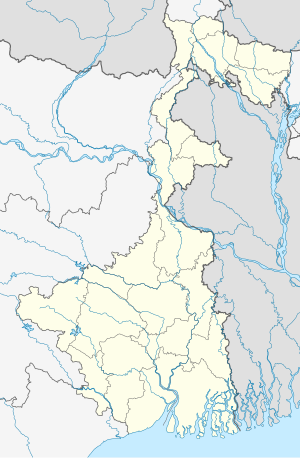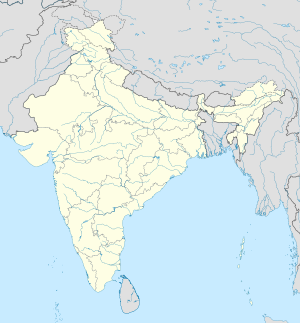Kulpi is a village and a gram panchayat within the jurisdiction under Kulpi police station in the Kulpi CD block in the Diamond Harbour subdivision of the South 24 Parganas district in the Indian state of West Bengal.
Kulpi | |
|---|---|
Village | |
 Kulpi bus stand | |
| Coordinates: 22°04′53″N 88°14′42″E / 22.0815°N 88.2449°E | |
| Country | |
| State | |
| District | South 24 Parganas |
| CD block | Kulpi |
| Area | |
• Total | 0.81 km2 (0.31 sq mi) |
| Elevation | 6 m (20 ft) |
| Population (2011) | |
• Total | 2,000 |
| • Density | 2,500/km2 (6,400/sq mi) |
| Languages | |
| • Official | Bengali[1][2] |
| • Additional official | English[1] |
| Time zone | UTC+5:30 (IST) |
| PIN | 743351 |
| Telephone code | +91 3174 |
| Vehicle registration | WB-19 to WB-22, WB-95 to WB-99 |
| Lok Sabha constituency | Mathurapur (SC) |
| Vidhan Sabha constituency | Kulpi |
| Website | www |
History
editIn the 18th century this area was occupied by Portuguese pirates.[3] So, the Nawab of Bengal stationed about 150 soldiers to make this area free.[citation needed]
Geography
edit5miles
Bagaria
Anantapathpur
M: municipal city/ town, CT: census town, R: rural/ urban centre, N: neighbourhood, H: historical place/ religious centre
Owing to space constraints in the small map, the actual locations in a larger map may vary slightly
Area overview
editDiamond Harbour subdivision is a rural subdivision with patches of urbanization. Only 14.61% of the population lives in the urban areas and an overwhelming 85.39% lives in the rural areas. In the western portion of the subdivision (shown in the map alongside) there are 11 census towns. The entire district is situated in the Ganges Delta and the western part, located on the east bank of the Hooghly River,[4] is covered by the Kulpi Diamond Harbour Plain, which is 5–6 metres above sea level. Archaeological excavations at Deulpota and Harinarayanpur, on the bank of the Hooghly River indicate the existence of human habitation more than 2,000 years ago.[5][6][7]
Note: The map alongside presents some of the notable locations in the subdivision. All places marked in the map are linked in the larger full screen map.
Location
editKulpi is located at 22°04′53″N 88°14′42″E / 22.0815°N 88.2449°E. It has an average elevation of 6 metres (20 ft).[8]
Demographics
editAccording to the 2011 Census of India, Kulpi had a total population of 2,000, of which 982 (49%) were males and 1,018 (51%) were females. There were 192 persons in the age range of 0–6 years. The total number of literate persons was 1,478 (81.75% of the population over 6 years).[9]
Civic administration
editPolice station
editKulpi police station covers an area of 166.63 km2. It has jurisdiction over parts of the Kulpi CD block.[10][11]
CD block HQ
editThe headquarters of the Kulpi CD block are located at PO Paschim Gopalnagar, Kulpi.[12]
Economy
editIndustry
editIn January 2014, the Government of West Bengal gave its clearance for the development of a ship breaking yard.[13]
Transport
editKulpi is on the junction of the National Highway 12 and State Highway 1.[14]
Kulpi railway station is on the Sealdah–Namkhana line of the Kolkata Suburban Railway system.[14][15]
Commuters
editWith the electrification of the railways, suburban traffic has grown tremendously since the 1960s. As of 2005-06, more than 1.7 million (17 lakhs) commuters use the Kolkata Suburban Railway system daily. After the partition of India, refugees from erstwhile East Pakistan and Bangladesh had a strong impact on the development of urban areas in the periphery of Kolkata. The new immigrants depended on Kolkata for their livelihood, thus increasing the number of commuters. Eastern Railway runs 1,272 EMU trains daily.[16]
Education
editKulpi Janapriya High School is a coeducational higher secondary institution.[17]
Healthcare
editKulpi Block Primary Health Centre, with 15 beds, at Kulpi, is the major government medical facility in the Kulpi CD block.[18]
References
edit- ^ a b "Fact and Figures". Wb.gov.in. Retrieved 5 July 2019.
- ^ "52nd REPORT OF THE COMMISSIONER FOR LINGUISTIC MINORITIES IN INDIA" (PDF). Nclm.nic.in. Ministry of Minority Affairs. p. 85. Archived from the original (PDF) on 25 May 2017. Retrieved 5 July 2019.
- ^ Sundarabana, dāridrya o bañcanāra samīkshā (in Bengali). Mālṭi Buka Ejensī. 1992.
- ^ Sen, Amrita (25 November 2021). A Political Ecology of Forest Conservation in India: Communities, Wildlife and the State. Routledge. ISBN 978-1-000-47766-5.
- ^ "District Statistical Handbook 2014 South Twety-four Parganas". Table 2.1, 2.2, 2.4b. Department of Statistics and Programme Implementation, Government of West Bengal. Archived from the original on 21 January 2019. Retrieved 5 December 2019.
- ^ "Census of India 2011, West Bengal, District Census Handbook, South Twentyfour Parganas, Series – 20, Part XII-A, Village and Town Directory" (PDF). Page 13, Physiography. Directorate of Census Operations, West Bengal. Retrieved 5 December 2019.
- ^ "District Human Development Report: South 24 Parganas". Chapter 9: Sundarbans and the Remote Islanders, p 290-311. Development & Planning Department, Government of West Bengal, 2009. Archived from the original on 5 October 2016. Retrieved 5 December 2019.
- ^ Falling Rain Genomics, Inc - Kulpi
- ^ "C.D. Block Wise Primary Census Abstract Data(PCA)". 2011 census: West Bengal – District-wise CD Blocks. Registrar General and Census Commissioner, India. Retrieved 26 April 2016.
- ^ "Kulpi". Sundarban police district. West Bengal police. Retrieved 20 October 2019.
- ^ "District Statistical Handbook 2014 South 24 Parganas". Table No. 2.1. Department of Statistics and Programme Implementation, Government of West Bengal. Archived from the original on 21 January 2019. Retrieved 20 October 2019.
- ^ "BDO Offices under South 24 Parganas District". West Bengal Public Library Network, Government of West Bengal. Archived from the original on 3 October 2018. Retrieved 20 October 2019.
- ^ "State gives go-ahead to 7 industrial projects". Kolkata: The Statesman. Retrieved 14 January 2014.
- ^ a b Google maps
- ^ "34792 Sealdah-Namkhana Local". Time Table. India Rail Info. Retrieved 15 December 2019.
- ^ Mondal, Bhaswati. "Commuting and Metropolitan Development of Kolkata". Retrieved 16 December 2019.
- ^ "Kulpi Janapriya High School (HS)". Schoolspedia. Retrieved 1 December 2019.
- ^ "Health & Family Welfare Department" (PDF). Health Statistics – Block Primary Health Centres. Government of West Bengal. Retrieved 1 December 2019.

